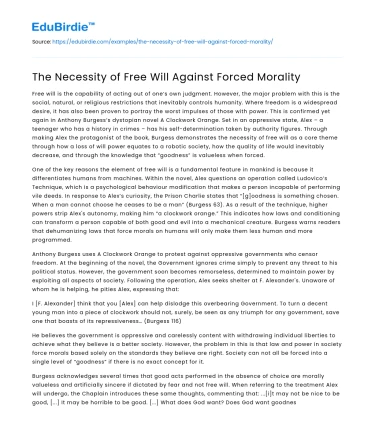Free will is the capability of acting out of one’s own judgment. However, the major problem with this is the social, natural, or religious restrictions that inevitably controls humanity. Where freedom is a widespread desire, it has also been proven to portray the worst impulses of those with power. This is confirmed yet again in Anthony Burgess’s dystopian novel A Clockwork Orange. Set in an oppressive state, Alex – a teenager who has a history in crimes – has his self-determination taken by authority figures. Through making Alex the protagonist of the book, Burgess demonstrates the necessity of free will as a core theme through how a loss of will power equates to a robotic society, how the quality of life would inevitably decrease, and through the knowledge that “goodness” is valueless when forced.
One of the key reasons the element of free will is a fundamental feature in mankind is because it differentiates humans from machines. Within the novel, Alex questions an operation called Ludovico’s Technique, which is a psychological behaviour modification that makes a person incapable of performing vile deeds. In response to Alex’s curiosity, the Prison Charlie states that “[g]oodness is something chosen. When a man cannot choose he ceases to be a man” (Burgess 63). As a result of the technique, higher powers strip Alex's autonomy, making him “a clockwork orange.” This indicates how laws and conditioning can transform a person capable of both good and evil into a mechanical creature. Burgess warns readers that dehumanizing laws that force morals on humans will only make them less human and more programmed.
Save your time!
We can take care of your essay
- Proper editing and formatting
- Free revision, title page, and bibliography
- Flexible prices and money-back guarantee
Anthony Burgess uses A Clockwork Orange to protest against oppressive governments who censor freedom. At the beginning of the novel, the Government ignores crime simply to prevent any threat to his political status. However, the government soon becomes remorseless, determined to maintain power by exploiting all aspects of society. Following the operation, Alex seeks shelter at F. Alexander's. Unaware of whom he is helping, he pities Alex, expressing that:
I [F. Alexander] think that you [Alex] can help dislodge this overbearing Government. To turn a decent young man into a piece of clockwork should not, surely, be seen as any triumph for any government, save one that boasts of its repressiveness… (Burgess 116)
He believes the government is oppressive and carelessly content with withdrawing individual liberties to achieve what they believe is a better society. However, the problem in this is that law and power in society force morals based solely on the standards they believe are right. Society can not all be forced into a single level of “goodness” if there is no exact concept for it.
Burgess acknowledges several times that good acts performed in the absence of choice are morally valueless and artificially sincere if dictated by fear and not free will. When referring to the treatment Alex will undergo, the Chaplain introduces these same thoughts, commenting that: ...[i]t may not be nice to be good, [...] It may be horrible to be good. [...] What does God want? Does God want goodness or the choice of goodness? Is a man who chooses the bad perhaps in some ways better than a man who has the good imposed upon him? (Burgess 71)
The Prison Chaplain recognizes that Ludovico’s Technique does not make one act out of morality, but simply from physical compulsion. Alex now ceases doing wrong only because he is afraid of physical pain. Moreover, it is equally immoral being totally good as it is being totally vicious. Both must exist alongside each other because without wrong and personal struggle as an option, goodness becomes meaningless. By forcing good morals onto Alex, the Government has eliminated his freedom to choose, which is greater than any sin.
Anthony Burgess’s novel A Clockwork Orange highlights the importance of free will by the arguments that a loss of free will makes an individual mechanical, how the quality of life would become oppressive, and through the knowledge that good acts in the absence of choice are empty. Burgess valued choice over anything and implied that humanity must always have the power to make their own choices, actions, beliefs, and judgements; regardless if it results in immorality. Repression of behaviour causes the destruction of humans as opposed to the rescuing. Therefore, free will is essential to maintain humanity as altering it disrupts the essence of man.






 Stuck on your essay?
Stuck on your essay?

